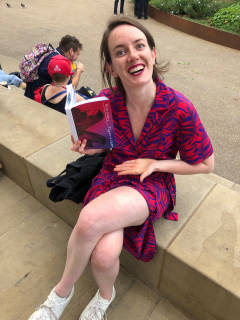Laura Snapes

Laura Snapes
Laura Snapes (1988/1989)[1] is a British music Journalist, currently deputy music editor at The Guardian.[2] She was previously an editor for NME and Pitchfork.
Early life and education
Snapes attended Truro High School in Cornwall.[3] She later attended two different universities but dropped out of both, and pursued a career in music journalism.[4] In 2009, while a student at the University of Bristol, she was shortlisted for the Guardian Student Media Awards for Critic of the Year in association with NME.[5]
Career
Snapes was a feature editor of NME (2013–2015), associate editor at Pitchfork (2012–2013), and assistant reviews editor of NME (2010–2012).
She also worked as a senior editor at The Pitchfork Review and contributing editor to Pitchfork between 2015–2016.
Snapes has contributed to a variety of publications such as Pitchfork (website), The Guardian, The Observer, Q, Mojo, Financial Times, Uncut, Rookie, The Wire, NPR, The Fader, Vulture, Lenny, Buzzfeed, MTV News, and BBC. Snapes also regularly appears on The Monocle Arts Review on Monocle 24 and on the Bbc.
A special issue of British magazine NME, titled "The 500 Greatest Albums of All Time", was published on 23 October 2013.[6] NME's listing was criticised by the media.
The Guardian noted that Snapes, an NME's Features Editor at the time, rated in her top four spots four albums by the same band, The National.[7] Snapes included a fifth National's album at number 7 in her top ten greatest albums of all time.
Similarly another NME journalist, Kevin EG Perry, also selected four albums by the same band in his top four spots, this time The Rolling Stones.
Ben Kaye of Consequence of Sound wrote that "if Laura Snapes had her wish, the top four would all be The National albums".[8]
In April 2016, Snapes' documentary The Drop Out Boogie about university dropouts was presented on BBC Radio 4.
Snapes was appointed to the role of Deputy Music Editor at The Guardian on 15 January 2018.[9]
In 2019, Snapes wrote the book Phoenix: Liberté, Égalité, Phoenix!, an oral history and archive of the 30-year career of the French band Phoenix.
The book was co-written by the band's members Thomas Mars, Deck d'Arcy, Laurent Brancowitz, and Christian Mazzalai.[14] The book was published by Rizzoli on 15 October 2019 by Rizzoli.[15] Snapes previously interviewed Phoenix for Q magazine in 2017. She was contacted by the band in 2018 and asked to write the book. Snapes interviewed each member of the band individually in Paris in November 2018. She also later conducted phone and e-mail interviews with the band and people close to them, including Thomas Mars' father and his wife Sofia Coppola.[16] Ellen Johnson of Paste wrote, "When one of the best music journalists/critics around gets together with one of the best rock bands around, the result could only be something close to magic."[17]
Mark Kozelek
In 2015, Snapes interviewed Mark Kozelek of the band Sun Kil Moon over e-mail.
She had approached friends of Kozelek for supporting interviews, but later learned that Kozelek previously asked journalists not to do so when writing a piece on him.
On 1 June 2015, Kozelek improvised a song about Snapes during a concert at the Barbican in London, performing to an audience of 1,900 people.
He told the audience, "There's this girl named Laura Snapes, she's a journalist.
She's out to do a story on me, has been contacting a lot of people who know me."
The song included derogatory lyrics, including, "Laura Snapes totally wants to fuck me / get in line, bitch...
Laura Snapes totally wants to have my babies."
Snapes posted audio of the incident online and wrote about her experience in a piece for The Guardian.[21][22] Snapes wrote:
He can use sexually violent language to reduce female critics to the status of groupies, knowing that while male musicians' misogynist acts are examined for nuance and defended as traits of “difficult” artists, women and those who call them out are treated as hysterics who don't understand art.
Amanda Palmer
In November 2019, singer Amanda Palmer took to Twitter to accuse The Guardian's "music editor" of blacklisting her from the publication after it did not feature her third solo album There Will Be No Intermission in its coverage.[25][26] Snapes previously blocked Palmer on Twitter in 2012 after an argument over Palmer's "paying her band in hugs and beer" controversy.[27][28] Palmer discovered she was blocked and tweeted this to her fans, initially not naming Snapes. Snapes, who is The Guardian's deputy music editor and not its music editor, responded by saying she lacked the power to blacklist artists. Snapes also detailed a "bizarre campaign" of harassment from Palmer, which included Pamer hiring a journalist to ask Snapes why she was not a fan of Palmer. Palmer also invited Snapes to the White House Correspondents' Dinner and was also allegedly planning to devote a segment of her Europe tour to how Snapes "orchestrated a Guardian-wide ban on coverage of her album." Palmer also mentioned Snapes on The Tim Ferriss Show in April 2019, saying, "I can't stop thinking about how I want to win her over, and change her mind, and force her to love me, and connect with me, and see the light. It's almost bordering on a mental obsession."[29] Palmer, who had 1.1 million followers on Twitter at the time, later named Snapes as the "music editor" she previously referred to. Ben Beaumont-Thomas, music editor of The Guardian, defended Snapes on Twitter, writing that an artist is "not automatically entitled to coverage" and explaing that The Guardian has a limited number of albums it can cover each week. Snapes called the experience "disturbing" and said that she had been harassed by male musicians in the past but did not expect it from Palmer, who is an outspoken feminist musician.
In 2020, Snapes was featured in an article in the Columbia Journalism Review where she discussed the incident. She described the relationship between musicians and critics in the age of social media, where "artist-loyal audiences can reach into the millions" and "may confront a writer who lacks the manpower to respond."


